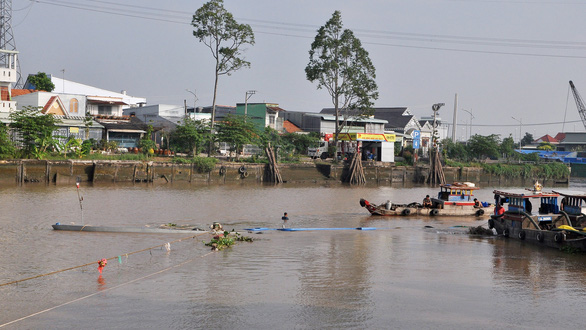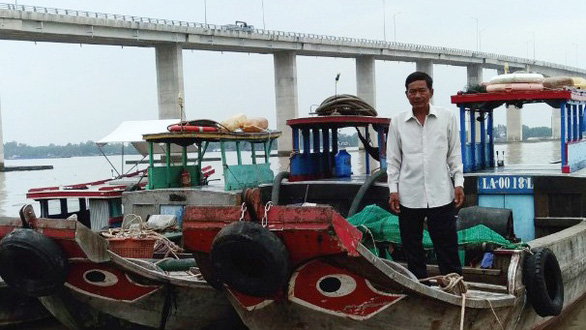A ‘squad’ of certified divers live in a small neighborhood in Long An Province. They have been salvaging boats and recovering corpses for a living for many years.
Tran Van Chau, born in 1964, commonly known as Tam Chau, is the senior diver in his team.
“We've all had to stay onshore the last few months because of the pandemic,” he referred to the COVID-19 impact on their job.
Tam Chau and other divers live around the foot of My Loi bridge in Ward 4, Phuong Dong Commune, Can Duoc District, Long An Province.
This bridge runs across Soai Rap River, connecting Long An Province and Tien Giang Province, both in the Mekong Delta region of Vietnam.
His father was commissioned to dive into Soai Rap River to pick up large wood logs that had sunk there, according to Tam Chau.
These logs were transported along Vam Co River to Go Cong District in Tien Giang Province, all the way from the southeast of Vietnam.
They were meant to provide materials for the production of a well-known wooden altar cabinet by the local craftsmen.
“My father alone could not do this job easily, so he called for extra help from his family members and neighbors,” Tam Chau added.
“At that time, all these families were poor and had no farms or fields to work on.
They were willing to dive because it could bring them some money.
“Over time, my father and others soon trained themselves to become very good divers.”
The age of 16 marked Tam Chau’s first diving trip with his father. They were looking for wood logs and sunken boats and canoes.
In the past, the diving gear consisted of a mere rope tied around the diver’s waist on one end, and fastened to a small canoe on the other.
“Divers had to go up the surface continuously for gasps of air,” Tam Chau said.
“But that was the thing of the past.
"Now we have a lot more equipment, especially oxygen tanks for breathing underwater.
“So our working time can be lengthened."
During his first working days, Tam Chau was merely helping out on his father’s diving trips.
He soon learned the tricks and became a lead diver on their team.
After his father retired from old age, Tam Chau gradually made his way to become the leader of the whole diving squad in this region.
He has remained in this position until now.
His two children are also following in his footsteps.
The tools, the kit, and the risk
The divers’ boats are parked neatly in a row behind their houses, in Rach La Rivulet and Soai Rap River.
On the shore, one can easily see a pile of strings, rubber pipes, drills, water pumps, sand dredger machines, steel cutters, and other equipment.
According to Tam Chau, the most crucial tool is the oxygen supplier. There are normally two of them in a kit, a working tank and a spare one.
They are to be working properly all the time because they are the lungs and heart of the divers.
If the primary oxygen tank breaks down, the partner on the boat has to operate the spare tank instantly in order to maintain the oxygen supply to his workmate below.
When both of the tanks have a failure, the diver has to be removed from the depths immediately.
Nobody dares to ‘dive without the tanks.'
From Tam Chau’s accounts, the job is rather perilous, drawing a very fine line between life and death.
A minute of distraction might result in a fatal accident, so the divers always have to stick to their safety principles and be aware of their situations.
Before and after each diving trip, the team has to perform a close-up inspection of their machinery.
This is one aspect of their safety guidelines.
“Any one of us [the divers] has to be able to operate and maintain his gear, so that he can quickly assist his diving partner,” said Tam Chau.
A diver also has to be in good health on working days. Tam Chau makes sure that any sick member does not get to dive due to safety reasons.
|
|
| Tran Van Chau, or Tam Chau, is an experienced diver. He is seen on a diver boat on Soai Rap River in Long An Province, Vietnam. Photo: Hung Anh |
Despite their handed-down skills and expertise, all of the divers still need to pass a recognized diving test and obtain their certificates.
“It is extremely muddy down there because the water of the Mekong Delta river is full of alluvium,” said Tran Van Tan, born in 1972, who is Tam Chau’s brother.
He is known as Muoi Tan and has been 30 years into the job.
“The divers basically see nothing," Muoi Tan said.
"They rely on their hands to locate and manipulate equipment, including pumps and others.
“Whether the diver has to remove nuts and bolts, or cut through steel, it is all done in total darkness.
“Weather permitting, the job is less demanding with smooth currents and calm water surface.
"But it’s really tough on a stormy day with strong currents.”
Talking about a diver’s biggest threats, Tam Chau mentioned two of them.
“One is getting stuck, the other is having the oxygen pipe cut in half.”
The money
The first thing for a diver to look for before making his dive is to investigate his subject, according to Muoi Tan.
He has to find out if the sunken boat was carrying cargo, which type of cargo was on it, whether there are any people stuck inside, the location of the boat, and the authorization letter for diving from the authorities.
For construction sites, divers also need to understand clearly the requirements of the owners, and figure out the precise location.
Then, they perform a field test to gauge the amount of workload.
“The price can vary from a few thousand dollars to a few grand for salvage diving, depending on the depths and workload,” said Muoi Tan.
“For underwater construction projects, the earning can be ten times the normal rate, dependent on the scope of the project, the workload, and the length of construction.
“It is a dangerous job, so each shift can last no more than two hours.
"Those more fit can work two shifts a day, while the less physically able work only one.
“For each dive, a diver can get paid a maximum of VND1 million [USS$44], subject to the complications involved.
"Diving in the night is generally avoided because that is too risky."
The river god
Once a contract has been signed, Tam Chau will pick a lucky hour based on his calculation of the lunar calendar.
A praying ritual follows, with offerings made to the river god.
Tam Chau himself kneels down to pray, hoping the river god will ease their dives and keep them safe from the strong winds and accidents.
Only the very brave members of the team dare to perform human body recovery dives, according to Muoi Tan.
“We agree among each other that if the victim’s family is too poor, we will recover bodies for free and only charge the fee for salvaging their boats,” he said.
“We believe that is the way to build a better karma for our children.
“Divers are widely known to see things in the deep water, but they must not disclose the details because they have sworn to the river god that what is in the water stays in the water."
The river god watches over all those who make a living out of the river, Muoi Tan underlined.
After the sacrifices are made, Tam Chau has to dive himself to confirm the amount of work.
Then, he gets back onshore to make the final assignment of jobs to his team.
If there is a dead body, that has to be their priority, so that the family can host a funeral.
Salving boats is done afterward.
Like us on Facebook or follow us on Twitter to get the latest news about Vietnam!




















































